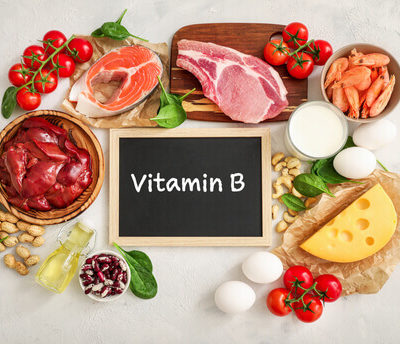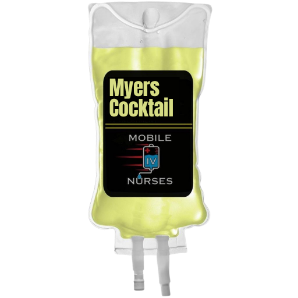
What is Vitamin C, or Ascorbic Acid?
December 28, 2020
How IVs Can Quench Your Chronic Dehydration
January 22, 2021
Vitamin B complex is composed of a combination of the eight B vitamins, commonly B1-B6. The eight B vitamins are:
- B1 (thiamine)
- B2 (riboflavin)
- B3 (niacin)
- B5 (pantothenic acid)
- B6 (pyridoxine)
- B7 (biotin)
- B9 (folic acid)
- B12 (cobalamin)
Each of these essential vitamins plays a role in contributing to your overall bodily function.
General Function
All B vitamins are water-soluble which means they aren’t stored in the body effectively. But this also makes them easy to administer along with other essential vitamins via IV drip therapy. They help to convert carbohydrates, fats, and protein into energy, or glucose. B vitamins are necessary for keeping the liver, skin, hair, and eyes healthy. They also play a role in the nervous system, and they are needed for good brain function.
The B vitamins are sometimes called anti-stress vitamins because they boost the body’s immune system in times of stress.
B1 (Thiamine)
Benefits:
Vitamin B1, or thiamin, helps with the nervous system, brain, muscles, heart, stomach, and intestines. Vitamin B1, or thiamin, is involved in the flow of electrolytes into and out of muscle and nerve cells. People with impaired absorption such as ulcerative colitis, persistent diarrhea, and poor appetite may also receive vitamin B1, or thiamin. Some athletes use vitamin B1, or thiamin to help improve their performance.
Who is at risk for deficiency?
Individuals who have a poor diet, cancer, “morning sickness” vomiting during pregnancy, “hyperemesis gravidarum” excessive vomiting during pregnancy, have undergone bariatric surgery, and undergo hemodialysis are all at risk of thiamin deficiency. Additionally, individuals who regularly drink alcohol to excess may have a deficiency, as they may not be able to absorb the vitamin B1, or thiamin from their diet.
B2 (Riboflavin)
Benefits:
Vitamin B2, or riboflavin, is an essential component of two major coenzymes that play major roles in energy production; cellular function, growth, and development; and metabolism of fats, drugs, and steroids.
Who is at risk for deficiency?
The American College of Sports Medicine state that vegetarian athletes are at risk of riboflavin deficiency because of their increased need for this nutrient and because some vegetarians exclude all animal products (including milk, yogurt, cheese, and eggs). Pregnant or lactating women who rarely consume meats or dairy products, non-pregnant and lactating individuals with limited intakes of meat and dairy products have an increased risk of riboflavin deficiency.
Vitamin B2, or Riboflavin and Health: Migraine headaches
A migraine headache may produce an intense pulsing or throbbing pain in one area of the head accompanied by an aura. To some extent mitochondrial dysfunction is thought to play a contributing role in some types of migraine headaches. Given that riboflavin is required for mitochondrial function, researchers are studying the potential use of riboflavin to prevent or treat migraine headaches.
B3 (Niacin)
Benefits:
Vitamin B3, or niacin is made and used by your body to turn food into energy. It helps keep your nervous system, digestive system and skin healthy. Prescription vitamin B3, or niacin, is used to increase high-density lipoprotein (HDL) cholesterol, also known as the “good” cholesterol that helps remove low-density lipoprotein (LDL), also known as the “bad” cholesterol, from your bloodstream.
B5 (Pantothenic Acid)
Benefits:
Vitamin B5, or pantothenic acid, is critical to the production of red blood cells, as well as sex and stress-related hormones produced in the adrenal glands. Vitamin B5, or pantothenic acid is also important in maintaining a healthy digestive tract, and it helps the body use other vitamins, particularly vitamin B2, or riboflavin. Several small studies have suggested that pantetheine may help reduce triglycerides, or fats, in individuals with high cholesterol levels.
B6 (Pyridoxine)
Benefits:
Vitamin B6, or pyridoxine, is important for normal brain development and for keeping the nervous system and immune system healthy. Vitamin B6, or pyridoxine, in combination with vitamin B9, or folate and vitamin B12, or cobalamin may help improve cardiovascular heath by decreasing homocysteine levels that may increase risks of cardiovascular disease. Vitamin B6, or pyridoxine, may reduce the severity of morning sickness during pregnancy. There is also some low quality evidence that suggested that vitamin B6, or pyridoxine, might reduce symptoms of premenstrual syndrome (PMS).
B7 (Biotin)
Benefits:
Vitamin B7, or biotin, is needed to metabolize fats, carbohydrates, and protein. Results have been promising in a few studies that have tested the ability of vitamin B7, or biotin’s ability to lower blood glucose in people with Type 1 and Type 2 diabetes. There is some evidence that vitamin B7, or biotin, may improve the strength and durability of fingernails and enhance hair and skin health.
Who is at risk for deficiency?
While deficiency is rare, vitamin B7, or biotin deficiency is most likely to arise in women during pregnancy, individuals who have been receiving prolonged intravenous nutrition, infants who consume breastmilk with low amounts of biotin, individuals with impaired absorption due to an inflammatory bowel disease (IBD) or other gastrointestinal (GI) tract disorder as well as people who smoke.
B9 (Folic Acid)
Benefits:
Vitamin B9, also called folate or folic acid, is crucial for proper brain function and plays a significant role in mental and emotional health. It supports in the production of DNA and RNA, the body’s genetic material, and is particularly important when cells and tissues are growing rapidly, such as in infancy, adolescence, and pregnancy. Vitamin B9, also called folate or folic acid, also works closely with vitamin B12 to help make red blood cells and help iron work properly in the body. Vitamin B9, also called folate or folic acid, works with vitamin B6, or pyridoxine, and vitamin B12, or cobalamin, and other nutrients to control homocysteine levels which are associated with heart disease. Pregnant women need more vitamin B9, also called folate or folic acid, to lower the risk of neural tube birth defects, including cleft palate, spina bifida, and brain damage.
B12 (Cobalamin)
Benefits:
Vitamin B12, or cobalamin, is particularly important for maintaining healthy nerve cells, and it helps in the production of DNA and RNA, the body’s genetic material. Vitamin B12, or cobalamin, works closely with vitamin B9, also called folate or folic acid, to help make red blood cells and to help iron work better in the body. Vitamin B9, also called folate or folic acid and vitamin B12, or cobalamin, work together to produce S-adenosyl methionine (SAMe), a compound involved in immune function and mood. Vitamin B12, or cobalamin, vitamin B9, also called folate or folic acid, works with vitamin B6, or pyridoxine, and other nutrients to control homocysteine levels which are associated with heart disease.
References
https://ods.od.nih.gov/factsheets/Riboflavin-HealthProfessional/
https://www.empowerpharmacy.com/drugs/b-complex-injection
https://www.healthline.com/health/food-nutrition/vitamin-b-complex
https://www.mayoclinic.org/drugs-supplements-niacin/art-20364984
https://www.mayoclinic.org/drugs-supplements-vitamin-b6/art-20363468
https://www.medicalnewstoday.com/articles/219545
https://www.medicalnewstoday.com/articles/287720#deficiency
https://www.mountsinai.org/health-library/supplement/vitamin-b5-pantothenic-acid
https://www.mountsinai.org/health-library/supplement/vitamin-b9-folic-acid
FAQs
What is vitamin B complex best for?
The eight B vitamins included in vitamin B complex are all necessary for healthy bodily function. This is why many of our IV treatments include B complex. Those deficient in vitamin B may experience scaly skin, rashes, cracks around the mouth, weakness, nausea, diarrhea, and other conditions.
Vitamin B complex benefits include:
- Cardiovascular protection
- New red blood cell growth
- Boosting testosterone levels in men
- Cancer prevention
- Better digestion
- Improved appetite
- Hormone and cholesterol production
- Stress reduction
For pregnant women, vitamin B complex is vital. It reduces the risk of birth defects and aids in fetal brain development.
Is it okay to take vitamin B complex every day?
For most people, taking vitamin B complex every day is fine. However, much depends on the individual and their medical history. Pregnant women may need additional vitamin B complex, as do those following vegan or vegetarian diets. Vitamin B12 is available only from animal proteins, so those who do not consume these proteins are at risk of deficiency.
Keep in mind that B vitamins are water-soluble, meaning the body does not store them as it does fat-soluble vitamins.
What is the best time to take vitamin B complex?
For best results, take vitamin B complex early in the day along with your breakfast. While you can take B vitamins without food, some people may feel queasy taking them on an empty stomach.
Taking vitamin B complex at night can cause sleep issues. That’s because they help the body build energy, which is not what you want before you go to bed!
In fact, some people who take vitamin B complex at night experience vivid dreams.
Are there any vitamin B complex side effects?
Vitamin B complex is generally very safe, but side effects may occur with large doses. One common side effect is bright yellow urine, although this involves no harm to the body. Temporary flushing and gastrointestinal disturbances may take place when patients first begin taking vitamin B complex. These symptoms should disappear as the body adjusts to the dosage.
High doses of the following B complex vitamins may incur the following side effects:
B3: Flushing, nausea, vomiting, yellowing of the eyes or skin, and itching
B6: Loss of muscle control, numbness in the arms and legs, balance problems, bone pain
B9: Very high doses over the long term can cause kidney damage.
B12: High doses are contraindicated for people with kidney problems.
Is B complex good for the brain?
B complex vitamins are essential for healthy brain function. Vitamin B deficiency can result in neurological and physiological issues. Vitamin B complex may prevent dementia. In addition, it increases neurotransmitter production. These chemicals deliver messages from the brain to the body by targeting neurons or nerve cells. The body does not store the water-soluble B vitamins, so a constant supply is a necessity. Without sufficient vitamin B complex, the brain is more vulnerable to Alzheimer’s disease and general memory loss.
In particular, vitamins B6, B9, and B12 play a critical role in brain function and development.



